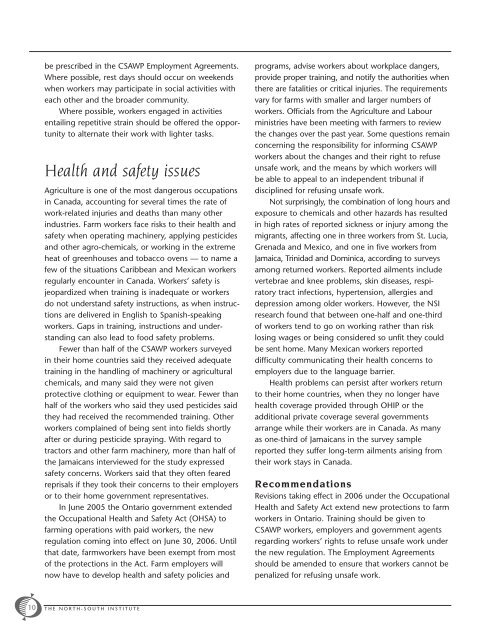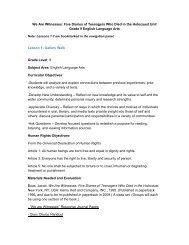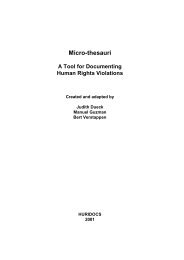Migrant Workers Canada
Migrant Workers in Canada - The North-South Institute
Migrant Workers in Canada - The North-South Institute
- No tags were found...
You also want an ePaper? Increase the reach of your titles
YUMPU automatically turns print PDFs into web optimized ePapers that Google loves.
e prescribed in the CSAWP Employment Agreements.<br />
Where possible, rest days should occur on weekends<br />
when workers may participate in social activities with<br />
each other and the broader community.<br />
Where possible, workers engaged in activities<br />
entailing repetitive strain should be offered the opportunity<br />
to alternate their work with lighter tasks.<br />
Health and safety issues<br />
Agriculture is one of the most dangerous occupations<br />
in <strong>Canada</strong>, accounting for several times the rate of<br />
work-related injuries and deaths than many other<br />
industries. Farm workers face risks to their health and<br />
safety when operating machinery, applying pesticides<br />
and other agro-chemicals, or working in the extreme<br />
heat of greenhouses and tobacco ovens — to name a<br />
few of the situations Caribbean and Mexican workers<br />
regularly encounter in <strong>Canada</strong>. <strong>Workers</strong>’ safety is<br />
jeopardized when training is inadequate or workers<br />
do not understand safety instructions, as when instructions<br />
are delivered in English to Spanish-speaking<br />
workers. Gaps in training, instructions and understanding<br />
can also lead to food safety problems.<br />
Fewer than half of the CSAWP workers surveyed<br />
in their home countries said they received adequate<br />
training in the handling of machinery or agricultural<br />
chemicals, and many said they were not given<br />
protective clothing or equipment to wear. Fewer than<br />
half of the workers who said they used pesticides said<br />
they had received the recommended training. Other<br />
workers complained of being sent into fields shortly<br />
after or during pesticide spraying. With regard to<br />
tractors and other farm machinery, more than half of<br />
the Jamaicans interviewed for the study expressed<br />
safety concerns. <strong>Workers</strong> said that they often feared<br />
reprisals if they took their concerns to their employers<br />
or to their home government representatives.<br />
In June 2005 the Ontario government extended<br />
the Occupational Health and Safety Act (OHSA) to<br />
farming operations with paid workers, the new<br />
regulation coming into effect on June 30, 2006. Until<br />
that date, farmworkers have been exempt from most<br />
of the protections in the Act. Farm employers will<br />
now have to develop health and safety policies and<br />
programs, advise workers about workplace dangers,<br />
provide proper training, and notify the authorities when<br />
there are fatalities or critical injuries. The requirements<br />
vary for farms with smaller and larger numbers of<br />
workers. Officials from the Agriculture and Labour<br />
ministries have been meeting with farmers to review<br />
the changes over the past year. Some questions remain<br />
concerning the responsibility for informing CSAWP<br />
workers about the changes and their right to refuse<br />
unsafe work, and the means by which workers will<br />
be able to appeal to an independent tribunal if<br />
disciplined for refusing unsafe work.<br />
Not surprisingly, the combination of long hours and<br />
exposure to chemicals and other hazards has resulted<br />
in high rates of reported sickness or injury among the<br />
migrants, affecting one in three workers from St. Lucia,<br />
Grenada and Mexico, and one in five workers from<br />
Jamaica, Trinidad and Dominica, according to surveys<br />
among returned workers. Reported ailments include<br />
vertebrae and knee problems, skin diseases, respiratory<br />
tract infections, hypertension, allergies and<br />
depression among older workers. However, the NSI<br />
research found that between one-half and one-third<br />
of workers tend to go on working rather than risk<br />
losing wages or being considered so unfit they could<br />
be sent home. Many Mexican workers reported<br />
difficulty communicating their health concerns to<br />
employers due to the language barrier.<br />
Health problems can persist after workers return<br />
to their home countries, when they no longer have<br />
health coverage provided through OHIP or the<br />
additional private coverage several governments<br />
arrange while their workers are in <strong>Canada</strong>. As many<br />
as one-third of Jamaicans in the survey sample<br />
reported they suffer long-term ailments arising from<br />
their work stays in <strong>Canada</strong>.<br />
Recommendations<br />
Revisions taking effect in 2006 under the Occupational<br />
Health and Safety Act extend new protections to farm<br />
workers in Ontario. Training should be given to<br />
CSAWP workers, employers and government agents<br />
regarding workers’ rights to refuse unsafe work under<br />
the new regulation. The Employment Agreements<br />
should be amended to ensure that workers cannot be<br />
penalized for refusing unsafe work.<br />
10 THE NORTH-SOUTH INSTITUTE





